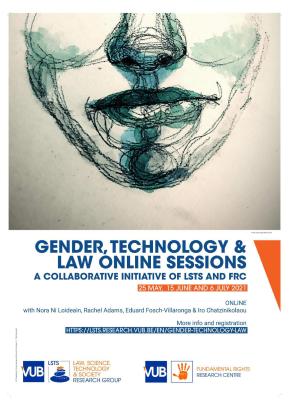The Gender, Technology & Law initiative is happy to announce a new series of online sessions to take place in May, June and July 2021, after its spring and autumn cycles.
The third online session of the current cycle will be animated by Argyro (Iro) Chatzinikolaou (Ghent University).
Registration:
The sessions are free to attend but registration is required. To register, please fill in the registration form. Should you face any difficulties with your registration, please send an e-mail to Olga Gkotsopoulou (LSTS) or Carlotta Rigotti (FRC).
Session description: Sexting amongst children: should it fall within the scope of criminal legislation?
Sexual(ised) images of children are often shared online. Sexting, meaning the creation and sharing of sexually explicit or suggestive, or (semi-) nude images/videos of oneself, is predominantly associated with the notions of risk and harm and has attracted considerable public anxiety. Risks that may arise are, for instance, coercion to produce such imagery, further distribution of intimate imagery without the consent of the person who is pictured, and, subsequently, the inclusion thereof in the corpus of circulating child sexual abuse material (CSAM). However, evidence shows that children are increasingly engaging with technology to establish and maintain intimate relationships, explore their sexual identity and express their sexual individuality.
Hence, the question arises: does consensual sexting amongst children fall within the scope of criminal legislation; and if so, should that be the case? During this seminar, the extent to which supranational legislative instruments enable the legitimate exploration and expression of children’s sexual identity shall be explored. Navigating between the (need for) protection and children’s freedom to explore and express their sexuality online raises further concerns regarding concepts such as the age of sexual consent, or issues such as the qualification of imagery as ‘sexual’, ‘pornographic’ or ‘illegal’. With the issue at stake associating with elements such as gender, morality, and culture, and the increasing rates of both consensual sexting amongst children and self-made intimate imagery of children ending up circulating as CSAM, the performed balancing appears to be inherently complex and cannot guarantee easy public policy solutions.
Speaker's bio:
Argyro (Iro) is a doctoral researcher in the research group Law & Technology at Ghent University and is affiliated with the department of Interdisciplinary Study of Law, Private Law and Business Law. Iro is a member of the Human Rights Centre of the Faculty of Law and Criminology, PIXLES (Privacy, Information Exchange, Law Enforcement and Surveillance) and the Academic Network for Sexual and Reproductive Health and Rights Policy (ANSER) and regularly contributes to the Strasbourg Observers blog.
Iro’s research revolves around the online sexual behaviour of children and, more precisely, focuses on the balance between the protection of children’s rights and the fulfilment of the need to protect children within the digital environment. She is currently working on the research project “Minors and online sexual acts: a study of legal qualifications and regulatory approaches from a children’s rights perspective” (FWO). In the context of her doctoral studies, she has presented her research before the Council of Europe Lanzarote Committee. Her list of publications can be found here.
Iro holds an LL.B. degree from the National and Kapodistrian University of Athens (NKUA, Greece) (Scholarship for academic excellence by the University of Athens A. Papadakis Trust), an LL.M degree in Civil Law from the same University and an LL.M degree in Law and Technology from Tilburg University (The Netherlands). She is also a qualified lawyer and a member of the Athens Bar Association. Prior to her doctoral studies, she practiced law in Athens, Greece. In addition, she worked as a legal intern at the Hellenic Republic Prosecutor’s Office in Athens, the Greek Council for Refugees (Athens, Greece), and the Consumers’ Association E.K.PI.ZO. (Athens, Greece).
Gender, Technology & Law Sessions: This session is part of the Gender, Technologies & Law Sessions, a collaborative initiative of the Law, Science, Technology and Society Research Group (LSTS) and the Fundamental Rights Centre (FRC) at the Vrije Universiteit Brussel. The initiative aims at investigating the intersections between gender, technology and law through an interdisciplinary approach. Outcomes of these investigations but also more explorative debates and open questions are presented in a series of seminars, both by internal and external speakers. For more information on the series, see here.



